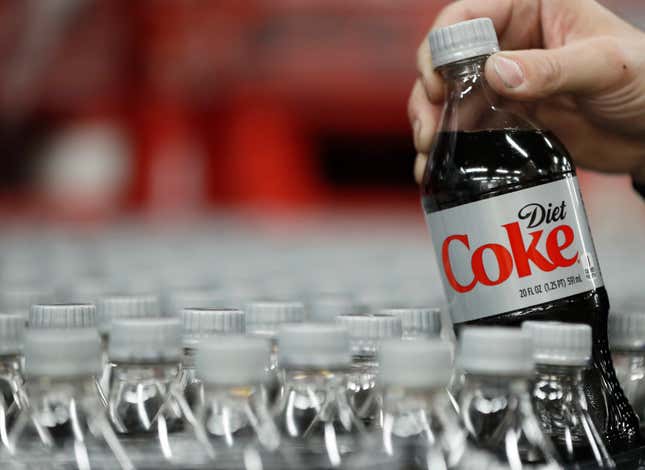
Aspartame, one of the world’s most popular sweeteners, is set to be declared a possible carcinogen by the World Health Organization (WHO), according to an exclusive report by Reuters.
The ubiquitous ingredient, found in sweet drinks and chewing gums, is “possibly carcinogenic to humans,” according to the International Agency for Research on Cancer (IARC), the WHO’s cancer research department, as quoted by Reuters.
The WHO’s conclusion is unlikely to have an immediate effect on the use of aspartame, but previous declarations like this one have led to increased scrutiny of the ingredient, as well as lawsuits against its manufacturers.
For example, the IARC determined the herbicide glyphosate, manufactured by Monsanto, was likely causing cancer in humans, leading to numerous lawsuits and dozens of bans on the chemical around the world.
The largest manufacturer of aspartame is Nutrasweet, which Monsanto purchased for $2.7 billion ($7.6 billion adjusted for inflation) in 1985. Monsanto sold the company in 2000, after growing it into one of the world’s most popular artificial sweeteners.
The Coca-Cola Company and Keurig Dr. Pepper—owners of popular diet sodas and juices that use aspartame—were not immediately available for comment on what the WHO’s decision means for their products.
What is aspartame and why is it bad for me?
The US Food and Drug Administration (FDA) first approved aspartame in 1974 as a food sweetener that is 200 times sweeter than sugar. It is a chemical compound, with the scientific name methyl ester, mainly used to sweeten low calorie or sugar-free drinks.
The FDA considers artificial sweeteners safe, to a point. The regulatory agency has set a high benchmark on the amount of healthy use, with an average-sized American having to drink an excessive amount of diet soda each day to experience severe negative health consequences.
The WHO isn’t the first to link the ingredient to cancer, however, with a French observational study with more than 100,000 subjects observing an elevated risk in subjects who consume large quantities of artificial sweeter, especially aspartame.
The full WHO report—with more information linking sweeteners with elevated cancer risk—is due to be released next month.
The most common foods using aspartame
Diet sodas: While purporting to be a healthy alternative, diet sodas are well-known to be as bad, if not worse, for your health than normal sodas for a number of reasons. Now, there is a new one: aspartame, used to sweeten the drinks without any sugar.
Sugar-free gums: Most sugar-free chewing gums use alternatives like aspartame and xylitol.
Coffee sweeteners: Common tabletop sweeteners like Equal and Nutrasweet contain aspartame. Again, many researchers suggest opting for regular sugar packets for your morning joe, especially considering artificial sweeteners can be extremely addictive.
Related stories:
Did you get the full story about artificial sweeteners and diabetes?
Why it sometimes seems like everything causes cancer
Think you know which foods have artificial sweeteners? Think again